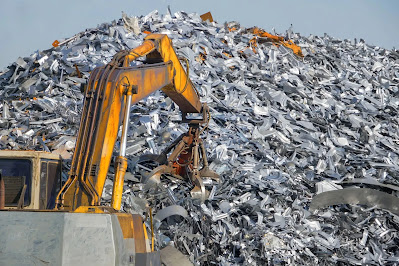The Amazing Environmental Impact of Recycling Scrap Metal
When we think about recycling, we often focus on items like paper, plastic, and glass. However, one often overlooked material that has a significant impact on the environment when recycled is scrap metal.
The process of recycling scrap metal Melbourne not only conserves natural resources and reduces greenhouse gas emissions, but it also has several surprising environmental benefits. In this blog we well explore amazing environmental impact of recycling scrap metal.
What is Scrap Metal?
Scrap metal refers to any metal that is no longer in use and can be recycled. This includes items such as old cars, appliances, steel beams, and aluminium cans. Instead of ending up in a landfill, scrap metal can be collected and processed for recycling.
Conserves Natural Resources
One of the most significant environmental benefits of recycling scrap metal is the conservation of natural resources. When metal is recycled, it can be melted down and used to create new products, reducing the need for virgin ore. This helps to preserve natural resources such as iron, aluminium, and copper, which are essential for manufacturing a wide range of products.
Reduces Greenhouse Gas Emissions
The production of new metal from virgin ore is an energy-intensive process that generates a significant amount of greenhouse gas emissions. By recycling scrap metal Melbourne, the need for this energy-intensive process is reduced, leading to lower emissions of carbon dioxide and other pollutants. In fact, according to the study of Scrap Recycling Industries, recycling scrap metal can reduce greenhouse gas emissions by up to 300 million tons annually.
Saves Energy
In addition to reducing greenhouse gas emissions, recycling scrap metal also saves a significant amount of energy. The energy savings from recycling aluminium, for example, are particularly noteworthy. It takes 95% less energy to recycle aluminium than it does to produce it from virgin ore. These energy savings not only reduce the environmental impact of metal production but also help conserve valuable energy resources.
Reduces Landfill Waste
When scrap metal is not recycled, it often ends up in landfills, where it can take hundreds of years to decompose. By recycling scrap metal, we can reduce the amount of waste that ends up in landfills, helping to conserve valuable landfill space and reduce the environmental impact of waste disposal.
Creates Jobs
Recycling scrap metal also has economic and social benefits. The scrap metal recycling industry creates jobs in collection, processing, and manufacturing, contributing to local economies and providing employment opportunities. Additionally, the recycling industry plays a vital role in the global supply chain, providing raw materials for the production of new products.
In conclusion, the environmental impact of recycling scrap metal Melbourne is significant and far-reaching. By conserving natural resources, reducing greenhouse gas emissions, saving energy, and reducing landfill waste, recycling scrap metal has a positive effect on the environment. Additionally, the economic and social benefits of the scrap metal recycling industry make it a crucial component of sustainable waste management.
As individuals, we can contribute to these environmental and economic benefits by recycling our scrap metal and supporting the scrap metal recycling industry. By doing so, we can help to create a more sustainable and environmentally friendly future for generations to come.




Comments
Post a Comment